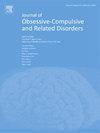治疗小儿强迫症的团体元认知疗法:试点研究
IF 1.5
4区 医学
Q3 PSYCHIATRY
Journal of Obsessive-Compulsive and Related Disorders
Pub Date : 2024-09-19
DOI:10.1016/j.jocrd.2024.100912
引用次数: 0
摘要
包括暴露和反应预防在内的认知行为疗法是治疗小儿强迫症的一线疗法,其反应率和缓解率分别约为 70% 和 53%。因此,仍有改进的余地。强迫症的元认知疗法(MCT)可能具有成本效益,其重点是改变对侵入性想法/感觉的重要性和危险性以及对仪式需要的元认知信念。MCT对成年人有效,但对青少年还需要进行评估。在本次研究中,11 名青少年被分为三组,接受了由一名 MCT 治疗师和一名助理主持的八次 75 分钟的 MCT 小组课程(以及两次 60 分钟的家长工作坊)。从治疗前到治疗后,CY-BOCS的组内效应大小(对冲克)为1.90,反应率和缓解率分别为82%和55%。次要结果的效应大小也很大。为取得这些结果,治疗师(一名获得认证的 MCT 治疗师和一名临床心理学学生合作)为每位患者花费了 2.18 次治疗,每次 75 分钟,此外,治疗师还为每位患者花费了 33 分钟为家长举办研讨会。由于没有进行后续评估,因此在解释结果时应谨慎。不过,这些结果令人鼓舞,并建议进一步评估 MCT 治疗小儿强迫症的效果。本文章由计算机程序翻译,如有差异,请以英文原文为准。
Group metacognitive therapy for pediatric obsessive-compulsive disorder: A pilot study
Cognitive-behavioral therapy including exposure and response prevention is the first-line treatment of pediatric OCD showing response- and remission rates around 70% and 53%. Thus, there is room for improvements. Metacognitive therapy (MCT) for OCD might be cost-effective and focuses on modifying metacognitive beliefs about the significance and dangerousness of intrusive thoughts/feelings, and about the need to perform rituals. MCT is effective in adults but needs to be evaluated in youths. In the current study, eleven adolescents divided in three groups received eight MCT group sessions of 75 min duration (and two 60 min workshop for parents) delivered by an MCT-therapist and an assistant. The within-group effect size (hedges g) from pre-to post-treatment on the CY-BOCS was 1.90, and the response and remission rates were 82% and 55%, respectively. Effect sizes for secondary outcomes were also large. Therapist time (one certified MCT-therapist and a clinical psychology student working together) used per patient to achieve these results were 2.18 therapy sessions of 75-min duration in addition to 33 min therapist time per patient of workshops for the parents. Follow-up assessments were not available, and the results should be interpreted with caution. However, they are encouraging and suggest that MCT for pediatric OCD should be evaluated further.
求助全文
通过发布文献求助,成功后即可免费获取论文全文。
去求助
来源期刊
CiteScore
4.00
自引率
5.60%
发文量
46
审稿时长
47 days
期刊介绍:
Journal of Obsessive-Compulsive and Related Disorders (JOCRD) is an international journal that publishes high quality research and clinically-oriented articles dealing with all aspects of obsessive-compulsive disorder (OCD) and related conditions (OC spectrum disorders; e.g., trichotillomania, hoarding, body dysmorphic disorder). The journal invites studies of clinical and non-clinical (i.e., student) samples of all age groups from the fields of psychiatry, psychology, neuroscience, and other medical and health sciences. The journal''s broad focus encompasses classification, assessment, psychological and psychiatric treatment, prevention, psychopathology, neurobiology and genetics. Clinical reports (descriptions of innovative treatment methods) and book reviews on all aspects of OCD-related disorders will be considered, as will theoretical and review articles that make valuable contributions.
Suitable topics for manuscripts include:
-The boundaries of OCD and relationships with OC spectrum disorders
-Validation of assessments of obsessive-compulsive and related phenomena
-OCD symptoms in diverse social and cultural contexts
-Studies of neurobiological and genetic factors in OCD and related conditions
-Experimental and descriptive psychopathology and epidemiological studies
-Studies on relationships among cognitive and behavioral variables in OCD and related disorders
-Interpersonal aspects of OCD and related disorders
-Evaluation of psychological and psychiatric treatment and prevention programs, and predictors of outcome.

 求助内容:
求助内容: 应助结果提醒方式:
应助结果提醒方式:


